Is inflation really scary?

Are the Fed and other central banks thinking adequately about inflation? Let's hope so, as long as they don't just think about inflation but also about employment and development. The speech by di Mario Lettieri, former undersecretary for the economy, and Paolo Raimondi, economist
The international economic circles more attentive to possible future trends are starting to ask themselves questions regarding the danger of a resumption of inflation. They fear it may exceed the optimal target of 2%. The biggest concern is with the United States.
Far be it from us to introduce another element of tension and fear into a situation that is already overloaded with problems. It seems to us, however, that we must reflect on the consequences of some decisions, which, even if necessary, deserve to be kept under control.
In recent days, the governor of the Federal Reserve , Jerome Powell, wanted to reassure the markets that the recent increase in Treasury bond yields would reflect optimism for the economic recovery and not the expectation of an inflationary recovery.
However, it seems appropriate to point out that historically the rise in inflation has always been linked to the excessive supply of liquidity with respect to demand. What governments and central banks have done in 2020 and are preparing to do in 2021, to contain the severely recessive effects of the pandemic, is of great significance. In the US, the Fed injected liquidity, bringing its balance sheet to over $ 7.6 trillion, an increase of nearly $ 3.5 trillion.
The Washington government has allocated public funds to support the economy and employment, bringing the annual deficit to 17% and the American public debt to the highest levels, equal to 132% of GDP. Furthermore, Biden has just announced another 1.9 trillion to address the Covid emergency and would prepare another 9% deficit. From February 2020 to today, the M2 index, which measures the availability of money and other very liquid financial assets, has grown by 26%, the strongest increase in American history. Europe has made a similar policy.
It is important to highlight the situation in the United States, also because what happens in that country always has strong repercussions in the rest of the world, primarily in Europe.
In the US, many deny the rise in inflation. In 2020, they say, there was deflation, with a loss of GDP and an annual increase in prices of less than 1.4%. If this is true, one wonders where all the liquidity made available has gone. Fortunately, some of them have allowed families and small businesses to overcome the emergency. A large part, however, ended up on the stock market. In the US, from March to the end of 2020, GDP lost 3.5% while the Dow Jones index gained 65%! Household savings also increased dramatically: in September 2020, compared to the same month of the previous year, it was $ 2,200 billion more.
Developments and effects are somewhat uncertain. "There is a possibility that macroeconomic stimulus, on a scale closer to World War II levels than normal recession levels, will trigger inflationary pressures of a kind we haven't seen in a generation," warned Larry Summers. treasury secretary with Clinton.
After vaccines and lockdowns, the aforementioned savings could turn into an intense demand for consumption of goods and services. Which could lead to a flare-up of inflation. Refinancing enormously grown debt may require an increase in the interest rates offered to find buyers.
Raw material prices are already on the move, despite production being lower than pre-pandemic ones. For example, the price of gasoline in the US has returned to the levels of early 2020, despite the fact that people travel much less. In 2020, the price of copper rose by 56%, that of soy by 54%, of timber by 117% and that of freight transport by 215%.
A certain concern is growing in Europe, expressed above all by German economists who are always terrified of the experience of the Weimar Republic. Even the chief economist of the ECB at the time of Mario Draghi, Peter Praet, feels the need to prepare for the new scenarios. It is an analysis also shared by Jens Weidmann, head of the Bundesbank.
The question that is circulating is: Are the Fed and other central banks thinking adequately about inflation? Let's hope so, as long as they don't just think about inflation but also about employment and development.
This is a machine translation from Italian language of a post published on Start Magazine at the URL https://www.startmag.it/economia/fa-davvero-paura-linflazione/ on Mon, 05 Apr 2021 06:02:20 +0000.
